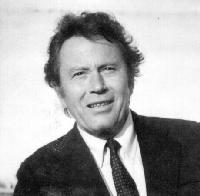
|
Richard
Wilbur's Lyrics of Christian Sensibility |
| lyric: "Any fairly
short, non-narrative poem [that] expresses a state of mind or a process of thought and
feeling" (M.H. Abrams, Glossary of Literary Terms, 4th ed.) "A brief subjective poem strongly marked by imagination, melody, and
emotion, and creating a single, unified impression." (Harmon and Holman, 7th
ed.)
(Problem -- both these definitions ignore the narrative
possibilities of some lyrics.)
dramatic monologue: "A poem that reveals 'a
soul in action' through the speaker of one character in a dramatic situation. The
character is speaking to an identifiable but silent listener at a dramatic moment in the
speaker's life. The circumstances surrounding the conversation, one side of which we
'hear' as the dramatic monologue, are made clear by implication" (Harmon and
Holman, 7th ed.)
"A poem in which a single speaker who is not the poet utters
the entire poem at a critical moment. The speaker has a listener within the poem, but we
too are his/her listener, and we learn about the speaker's character from what the speaker
says. In fact, the speaker may reveal unintentionally certain aspects of his/her
character." (M.H. Abrams, Glossary of Literary Terms,
4th ed.)
|
| The Christian Worldview and
Poetics In the worldview readings this semester, I
have asserted that certainly aspects of the literary experience resonate with
Christianity:
- Plot and verbal rhythm have their
source in God's creation of time. Both express aspects of what God has created us to
be as human beings. (cf. Time )
- Doxa, or glory, because it embraces
beauty, power, purity, and honor, provides a wider definition of the aesthetic experience
and grounds it in God's nature. (cf. Glory )
- The experience of mystery in poetry is analogous (but not identical) to
the experience of mystery in faith; it shares with it a certain kind of stance towards
life. (cf. Mystery )
- The skill and beauty of poetry are an
expression of God's nature in human beings, for that nature includes a love of craft. (cf.
Craft )
- Christ's incarnation represents the intersection of
time and eternity, history and the universal. As such, we can never make poetic
truth wholly personal and subjective or wholly social and objective. (cf. Incarnation )
- Poetry, by the very fact that it seeks to order and explain the
world, points to the perfect order of the eschaton. It promises an understood, even
harmonious, world.
- Poetry's investment in the concreteness of image and language is an
expression of the goodness of God's creation. It uncovers the meaning of the ordinary
world. (cf. Creation )
- There is, of course, also the obvious use of explicit Christian
themes.
|
Application
- Call attention to the way that Wilbur uses narrative or rhythm to
heighten a poem's power. (cf. "The Death of a Toad")
- Does "glory" effectively describe aspects of Wilbur's
poetry? Which aspects of doxa are present more often? Is there a
full-orbed occurrence of glory in any of the poems we have read?
- How does Wilbur use mystery in his poetry? Why would he leave
some things unexplained? (cf. "Ceremony," "The Mind-Reader")
- Point out a particularly well-crafted passage in Wilbur's poetry. How
does he shape his language to reinforce the poem's meaning?
- How does Wilbur's poetry seek to balance subjective experience and
the objective, concrete value of the world? How is this an expression of the
Incarnation? (cf. "The Beautiful Changes," "A World without Objects
Is a Sensible Emptiness," "Love Calls Us to the Things of This World")
- How does Wilbur's poetry seek to order and explain the world?
- How does Wilbur value the world through concrete imagery? (cf. the
use of printer's tools in "The Proof")
- What Christian doctrines are present in Wilbur's work? (cf. "The
Mind-Reader," "The Proof")
|
|
